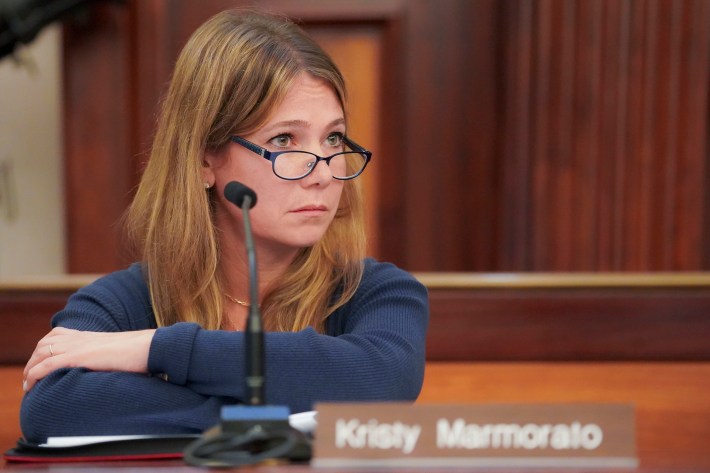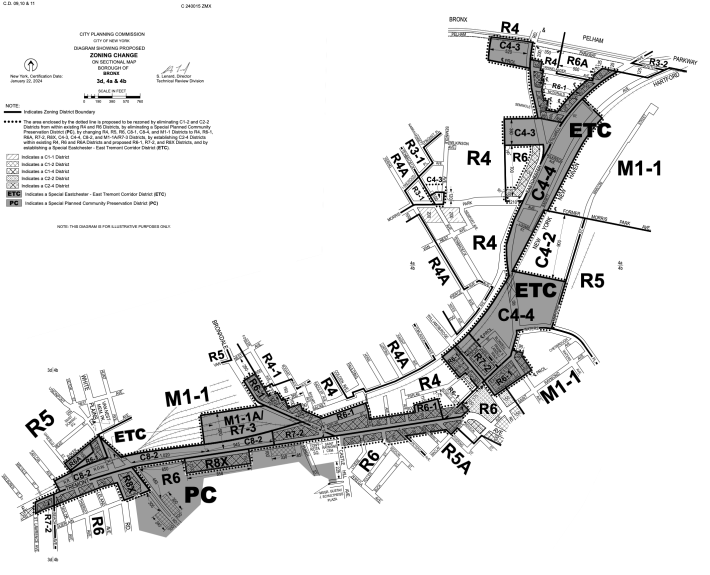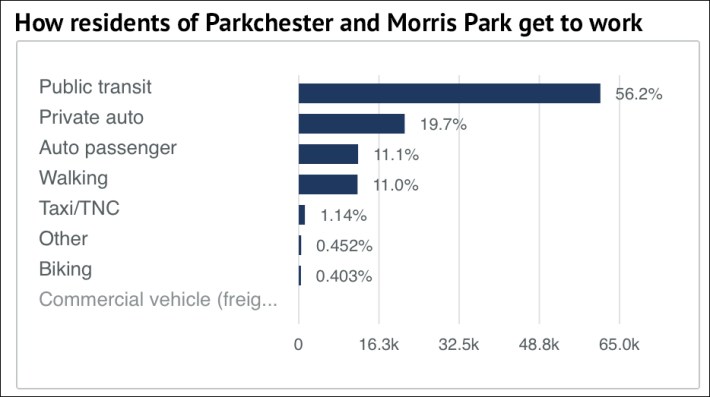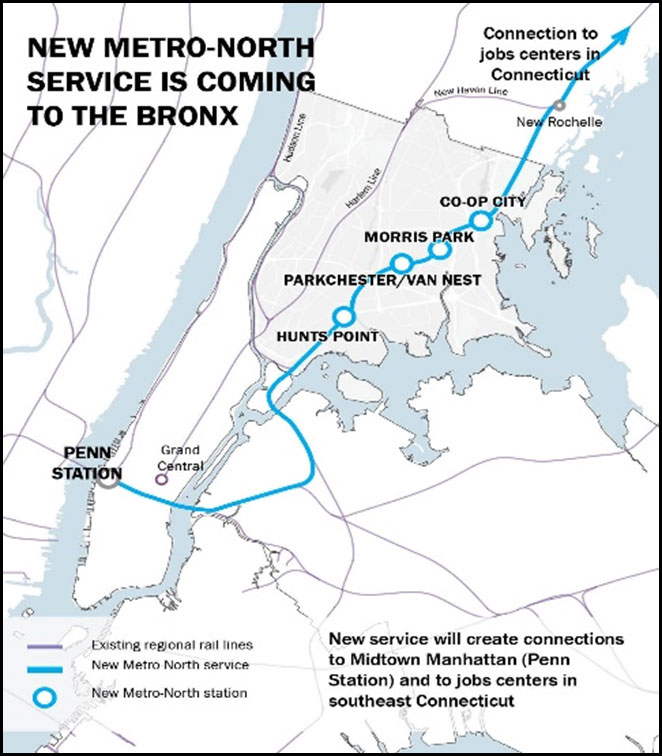She got her just desert.
A Bronx City Council member rallied the Land Use Committee on Tuesday to reject an Adams administration priority to no longer require developers to build costly parking spaces, saying that rezoning areas adjacent to two new Metro-North stations would "threaten" her "suburban transit desert" communities.
“The proposal ... threatened to alter our community in an unacceptable and irreversible way,” said Council Member Kristy Marmorato, a Republican who represents Morris Park and Van Nest, where two of the new stations are being built.

The construction of the stations themselves — part of a project that will cut commute times from the East Bronx to Penn Station by as much as 50 minutes, according to the MTA — did not seem to change Marmorato's view of her neighborhood, which she called a transit desert despite the major transit improvement on the way.
“We live in a transit desert where cars are a necessity for daily activities," she said. "The Bronx Metro-North rail is not here yet, and even after it arrives, people will still need their cars. We must be proactive in ensuring parking is a part of any zoning changes. That's why I have fought tirelessly to get our parking mandates back.”

Given the home Council member's position, the full Land Use Committee amended the proposal to keep the parking requirement before unanimously supporting the rezoning. The return of the parking mandate raises doubt that rezoning the so-called Special Eastchester-East Tremont Corridor District will end up creating the promised 7,000 units. Developers have championed the elimination of parking mandates because the requirement leads to higher costs and the creation of fewer affordable units.
The two new stations discussed on Tuesday — in Morris Park and Parkchester — are a part of the Penn Station Access Project, which will bring four new Metro-North stations to the Bronx utilizing an existing Amtrak line by 2027. The other stations are in Hunts Point and Co-op City.
The rezoning proposal was supposed to turn the area into hubs of transit-oriented development, a key pillar of the Adams administration's push for more, and more affordable, housing.
The plan on the table
The rezoning, first proposed in 2022, aims to redefine nearly 50 blocks in Parkchester, Van Nest, and Morris Park and create 7,000 new apartments, many of which will be affordable under the city’s Mandatory Inclusionary Housing program. Most new housing construction will occur in Marmorato’s district, but Council Member Amanda Farias’s neighboring district will also see development. Farias also mentioned parking in her testimony to the committee.
The map below shows the proposed rezoning, before the council's modification. Mid-density zoning districts like R4, and R6A, seen in grey, require so much parking to be built that developers have typically chosen to build far less housing than the lot can accommodate, exacerbating the city's housing shortage.
In an R4 district, developers have to build one parking space for each dwelling unit and on an R6 lot, a developer generally has to build parking for 70 percent of a building’s dwelling units. Without the mandates, a developer would be able to choose how much parking to build based on cost, feasibility and what the market needs.

In addition to hanging onto the dated parking mandates, the Council committee modified the proposal to lower building heights and preserve more low-density zoning.
Marmorato likened these modifications to “respect for the suburban lifestyle that has brought many families to the East Bronx for generations.”
In fact, the median income of her district — $78,500 — is roughly the same as the citywide median, both of which are far below household incomes in the suburbs. And the vast majority of work commutes — 67.2 percent — are made on transit or on foot. Only 19.7 percent of district residents get to work in their own car, according to data from Replica, the transportation modeling firm.

Despite the modifications to the proposal, the Adams administration saw the committee vote as a win for new housing.
“Today’s news is a step towards a historic investment in the Bronx for improved public spaces, enhanced transit access, and more affordable housing," a City Hall spokesperson said in a statement.
Trouble for 'City of Yes'?
The elimination of the parking mandate is a crucial part of the Mayor’s City of Yes for Housing Opportunity plan, a citywide rezoning that aims to create more housing by lowering developers' costs and also to allow for slightly higher buildings, especially near transit.
The plan will need approval from the City Council, where the parking mandate and higher density is under fire from autonormative pols like Marmorato.
She makes no bones about it.
"While new Metro-North stations can help reduce car dependency, achieving this vision requires a phased approach," Marmorato told Streetsblog. She claimed that she would like to see less driving, but added that she prioritizes the current needs of drivers over the long-term goal of creating new Metro-North stations as part of a strategy to reduce car dependency in her district.
"Engaging with residents to understand their needs and promoting alternative transportation options is essential to a process that would completely change the way of commuting in district – community engagement is the only way for positive and lasting change to take place. The current needs and realities of our community are the priority — and that involves accessibility for our drivers and cars," said Marmorato.
Her focus on parking, when the Penn Access project is meant to encourage transit-oriented development, is missing the point, transportation advocates said.
"The point of this project, and others like it, is to improve access to transit and livable streets so that we can put these outdated parking mandates behind us," said Sara Lind, co-executive director of Open Plans, which shares a parent organization with Streetsblog.

"This is an opportunity to start a virtuous cycle that allows the area to become something better. The residents of the Bronx Metro-North project will be far better served by more housing, more transit, and safer streets than by parking spots mandated in an arbitrary zoning calculation."
Morris Park resident Michael Kaess, who has long championed housing, testified in support of the original rezoning and the elimination of the parking mandate.
"My concern is, if we're unable to eliminate residential parking requirements for new transit-oriented development next to the new Metro-North stations, that it may not bode well for eliminating the parking mandate citywide [in City of Yes]," he told Streetsblog. "Ideally, this change was just to satisfy local 'member deference,' and that the Council hopefully eliminates the parking mandate citywide anyway.






